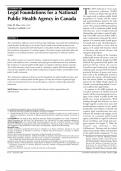COMMENTARY he 2003 outbreak of severe acute
Legal Foundations for a National T respiratory syndrome (SARS)
served as an abrupt wake-up call for
the urgent need to enhance public health
Public Health Agency in Canada preparedness in Canada, and the reports
and recommendations issued in the wake
of SARS serve as useful roadmaps for
Nola M. Ries, MPA, LLM1 action.1 The attention SARS generated has
Timothy Caulfield, LLM2 spurred a call to modernize public health
infrastructure, renew intergovernmental
relationships and enhance national leader-
ship. Post-SARS (and even before SARS2),
ABSTRACT many commentators advocated the devel-
opment of a national public health agency
This commentary addresses some of the key legal challenges associated with establishing a in Canada and, in turn, the federal govern-
national public health agency in Canada. These include issues related to privacy and ment has proceeded to create such an
confidentiality of personal health information in the public health context, constraints on agency, to be tasked with functions related
the jurisdiction and powers of a national agency, the need to respect individual rights and to infectious and chronic diseases and
freedoms in an outbreak situation, and international cooperation in infectious disease emergency preparedness.
control. However, the reform of the Canadian
public health system will create a variety of
The authors are part of a research initiative, comprised of experts in law, public health legal challenges. Indeed, though the SARS
policy and medicine, that is currently analyzing legal considerations that may influence outbreak has generated both public and
the mandate of a national public health agency in regard to infectious disease activities. political will for reform, the current
This article discusses critical issues raised at a meeting in August 2004 that brought the Canadian legal framework, including
research team together with key federal and provincial policy-makers and members of the enduring issues associated with the federal-
public health community. provincial division of powers and newer
issues such as the proliferation of privacy
The commentary emphasizes that law sets the foundation for public health activities, and laws across the country, will clearly impact
the promise of a national public health agency will only be realized if significant legal how that reform unfolds. As enabling leg-
issues are examined early on to ensure the agency is built on a robust legal and policy islation for the Public Health Agency of
framework. Canada is currently being drafted, it is crit-
ical to address these legal realities.
MeSH terms: Jurisprudence; communicable disease control; organization and In response to the SARS outbreak, the
administration Canadian Institutes of Health Research
issued a call for research proposals to inves-
tigate issues related to public health and
health care system preparedness. With
funding through this initiative, we have
brought together a multi-centre team with
interdisciplinary expertise in law, public
La traduction du résumé se trouve à la fin de l’article. health policy and medicine to identify and
1. Research Associate, Health Law Institute, University of Alberta examine legal considerations that may
2. Canada Research Chair in Health Law and Policy; Professor, Faculty of Law and Faculty of influence the mandate and impinge on the
Medicine & Dentistry, University of Alberta; Research Director, Health Law Institute, University of
Alberta activities of a national public health
Correspondence: Ms. Nola M. Ries, Research Associate, Health Law Institute, Law Centre, University of agency, particularly in regard to infectious
Alberta, Edmonton, AB T6G 2H5, Tel: 780-492-8343, Fax: 780-492-9575, E-mail: nries@law.ualberta.ca. disease surveillance and control and emer-
Acknowledgements: We acknowledge funding support from the Canadian Institutes of Health
Research and thank all participants at the First Collaborators’ Meeting in August 2004 for their insight gency response. On August 17, 2004, the
and suggestions. Special thanks to Geoff Moysa for preparing a report of the proceedings. research team convened a First
Research Team:
Timothy Caulfield, Canada Research Chair in Health Law & Policy; Professor, Faculty of Law and Collaborators’ Meeting with key federal
Faculty of Medicine & Dentistry, University of Alberta; Research Director, University of Alberta and provincial policy-makers and members
Health Law Institute of the public health community.* In this
Nola M. Ries, Research Associate, University of Alberta Health Law Institute
Elaine Gibson, Associate Director, Dalhousie Health Law Institute, Associate Professor, Faculty of Law * Attendees were: Kirsten Almquist, Dennis
Bartha Maria Knoppers, Professor, Faculty of Law, University of Montreal; Canada Research Chair in Brodie, François Daigle, Paul Gully, Lina
Law & Medicine; Senior Researcher, Centre de recherche en droit public Labreche, Jean-François Luc, Vanessa E. Pearson
Mireille Lacroix, Research Associate, Centre de recherche en droit public, University of Montreal and Frank Plummer (Health Canada); Brian
Kumanan Wilson, Assistant Professor, Departments of Medicine and Health Policy, Management and Emerson (BC Ministry of Health); Jean Joly
Evaluation, University of Toronto; Research Associate, Institute of Intergovernmental Relations, (Laboratoire de santé publique du Québec);
Queen’s University Richard Masse (Quebec Institut de Santé
Rosario Isasi, Research Associate, Centre de recherche en droit public Publique); and Elinor Wilson (Canadian Public
JULY – AUGUST 2005 CANADIAN JOURNAL OF PUBLIC HEALTH 281




